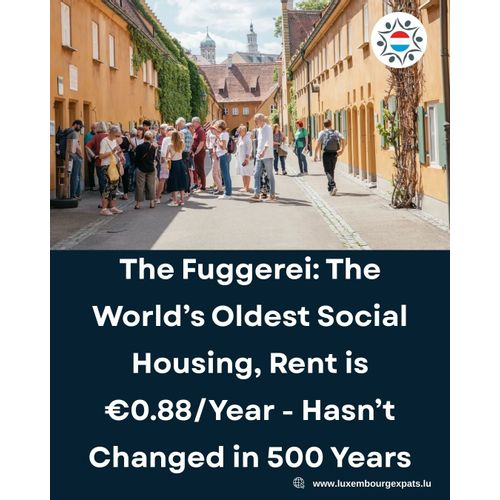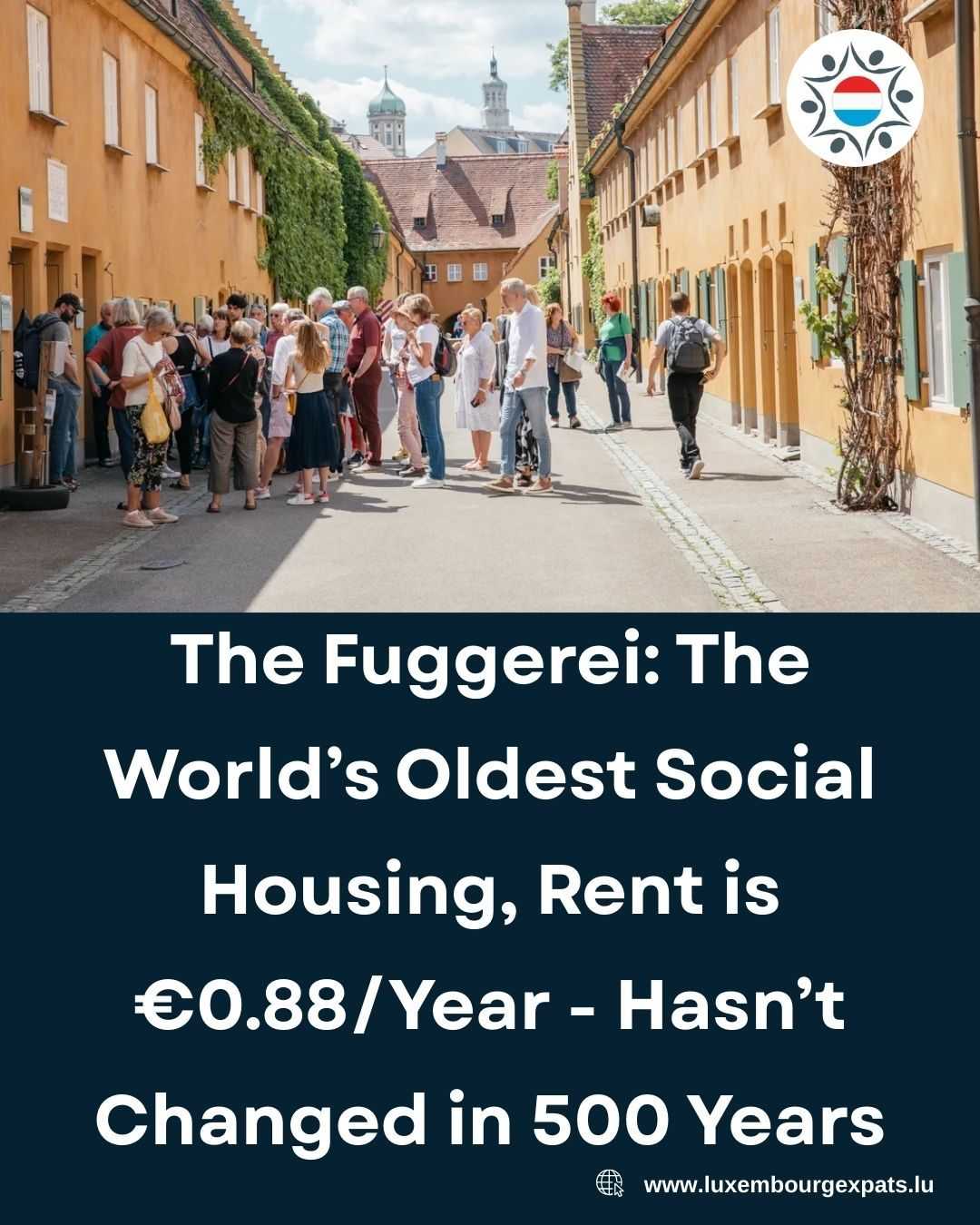The Fuggerei: The World’s Oldest Social Housing, Rent is €0.88/Year - Hasn’t Changed in 500 Years
LuxembourgPosted 6 months ago by Team · 5 min readNestled in the heart of Augsburg, Germany, lies a remarkable relic of history that defies modern economics: the Fuggerei, the world’s oldest social housing project, where residents pay a mere €0.88 per year - equivalent to one Rhenish guilder- for rent, unchanged since 1521. Founded by Jakob Fugger the Younger, a 16th-century banking magnate known as “Jakob the Rich,” this walled enclave is not just a housing complex but a living testament to visionary philanthropy, blending charity, community, and history in a way that captivates visitors and inspires urban planners worldwide.
A Vision Born in the Renaissance
In the early 1500s, Augsburg was a bustling hub of trade and finance, and Jakob Fugger was its wealthiest citizen. His banking empire funded emperors, popes, and wars, amassing a fortune that made him one of the richest men in history. But Fugger’s legacy extends beyond wealth. Driven by a mix of Catholic piety and a desire to secure his soul’s salvation, he established the Fuggerei in 1521 to house Augsburg’s poorest Catholic citizens. Unlike the grim workhouses of the era, which often split families, the Fuggerei offered dignified homes where families could stay together, a radical concept for the time.
Construction began in 1516, and by 1523, 52 houses formed the core of this “village within a city.” Today, the Fuggerei spans 67 buildings, 147 apartments, and St. Markus Church, housing about 150 residents. Its cobblestone streets, ochre-colored facades, and serene courtyards feel like a step back in time, yet the complex thrives as a modern community, sustained by a trust fund Fugger created with an initial deposit of 10,000 guilders.
A Rent Frozen in Time
What makes the Fuggerei truly extraordinary is its rent: €0.88 per year, the modern equivalent of one Rhenish guilder, a sum set in 1521 and never raised. To put this in perspective, a cup of coffee in Augsburg costs more than a year’s rent in the Fuggerei. This nominal fee covers not just housing but utilities like water, reflecting Fugger’s intent to provide affordable shelter without profit. The trust fund, now generating income primarily from forestry holdings, ensures the Fuggerei’s financial independence, a model of sustainability that has endured for over five centuries.
Residency comes with a few unique conditions. Tenants must be Catholic, Augsburg residents of at least two years, economically disadvantaged, and debt-free. They’re also expected to say three daily prayers—the Lord’s Prayer, Hail Mary, and Nicene Creed—for Jakob Fugger and his family, a nod to the founder’s spiritual motivations. While the prayer rule is part of the rental agreement, it’s not strictly enforced, relying on personal commitment. Residents also contribute to the community through part-time roles like gardening or night guard duties, fostering a sense of shared responsibility.
A Community Steeped in History
The Fuggerei is more than a housing project; it’s a living museum. Its 147 apartments, typically 45–65 square meters, house singles, couples, and families. Each home is modest but functional, with modern amenities like plumbing and electricity seamlessly integrated into the historic framework. The complex’s eight streets and three squares create a self-contained community, complete with a church built in 1582 and a fountain that adds to its old-world charm.
History has left its mark on the Fuggerei. During World War II, 70–75% of the complex was destroyed in 1944 bombings, but a bunker built in 1943 protected residents. Post-war reconstruction faithfully restored the original design, preserving its Renaissance aesthetic. One notable resident, Franz Mozart—a bricklayer and great-grandfather of Wolfgang Amadeus Mozart—lived here from 1681 to 1694, a connection commemorated by a plaque.
The Fuggerei’s quirks add to its allure. Before streetlights, each door had a unique bell pull—shaped like leaves, spirals, or animals—so residents could find their homes in the dark by touch. These pulls are still in place, delighting visitors. The complex also enforces a 10 PM curfew, with gates locked to maintain tranquility, though latecomers can enter for a small fee of €0.50–1, a rule now applied with flexibility.
A Tourist Haven and Modern Inspiration
Today, the Fuggerei is one of Augsburg’s top attractions, drawing visitors eager to explore its history. For €6.50—ironically, more than seven times the annual rent—tourists can visit a museum showcasing the Fuggerei’s evolution, a preserved historical apartment, a modern model apartment, and the WWII bunker, now an exhibit. The contrast between past and present is striking: residents live affordably in a place where tourists pay more for a single visit.
The Fuggerei’s model has sparked global interest. In 2021, to mark its 500th anniversary, the NEXT500 Pavilion initiative began exploring how the Fuggerei’s principles—affordable rent, community focus, and financial self-sufficiency—could inspire future social housing projects. Urban planners and policymakers study it as a blueprint for tackling modern housing crises, proving that Jakob Fugger’s vision remains relevant.
A Legacy That Endures
The Fuggerei stands as a paradox: a place where time seems frozen, yet its lessons resonate in the 21st century. It challenges our assumptions about housing, charity, and community, showing that a 500-year-old idea can still outshine many modern solutions. Jakob Fugger’s wealth came with controversies—his banking empire profited from monopolies and war financing- but the Fuggerei reflects a redemptive side, a commitment to the common good that has outlasted empires and wars.
As you stroll through its gates, past the ivy-covered walls and unique bell pulls, you’re not just walking through history—you’re witnessing a living experiment in compassion. The Fuggerei reminds us that with vision and resources, it’s possible to create something enduring, where €0.88 a year can still open the door to a home.
For more information or to plan a visit, check out the official Fugger website at fugger.de.
----
Join the community of your own - #1 home-grown LuxExpats app
SignUp Free: luxembourgexpats.lu
I am your contact
Team
Chat








